Reflective Writing: Experiences and Team Dynamics in Nursing
VerifiedAdded on 2023/06/10
|5
|1014
|236
AI Summary
This reflective writing assignment details a student nurse's experiences in a surgical ward, highlighting initial challenges such as bullying and ineffective teamwork, followed by improvements in team dynamics and communication. The reflection evaluates the impact of these experiences on the student's learning and emotional well-being, analyzing the importance of team bonding, feedback, and mutual respect in a healthcare setting. The conclusion emphasizes the importance of proactive team-building, transparent communication, and emotional support to prevent burnout and ensure patient safety. An action plan is included, outlining workshops and mentorship to further develop communication and teamwork skills. This document is available on Desklib, where students can find a variety of solved assignments and study resources.
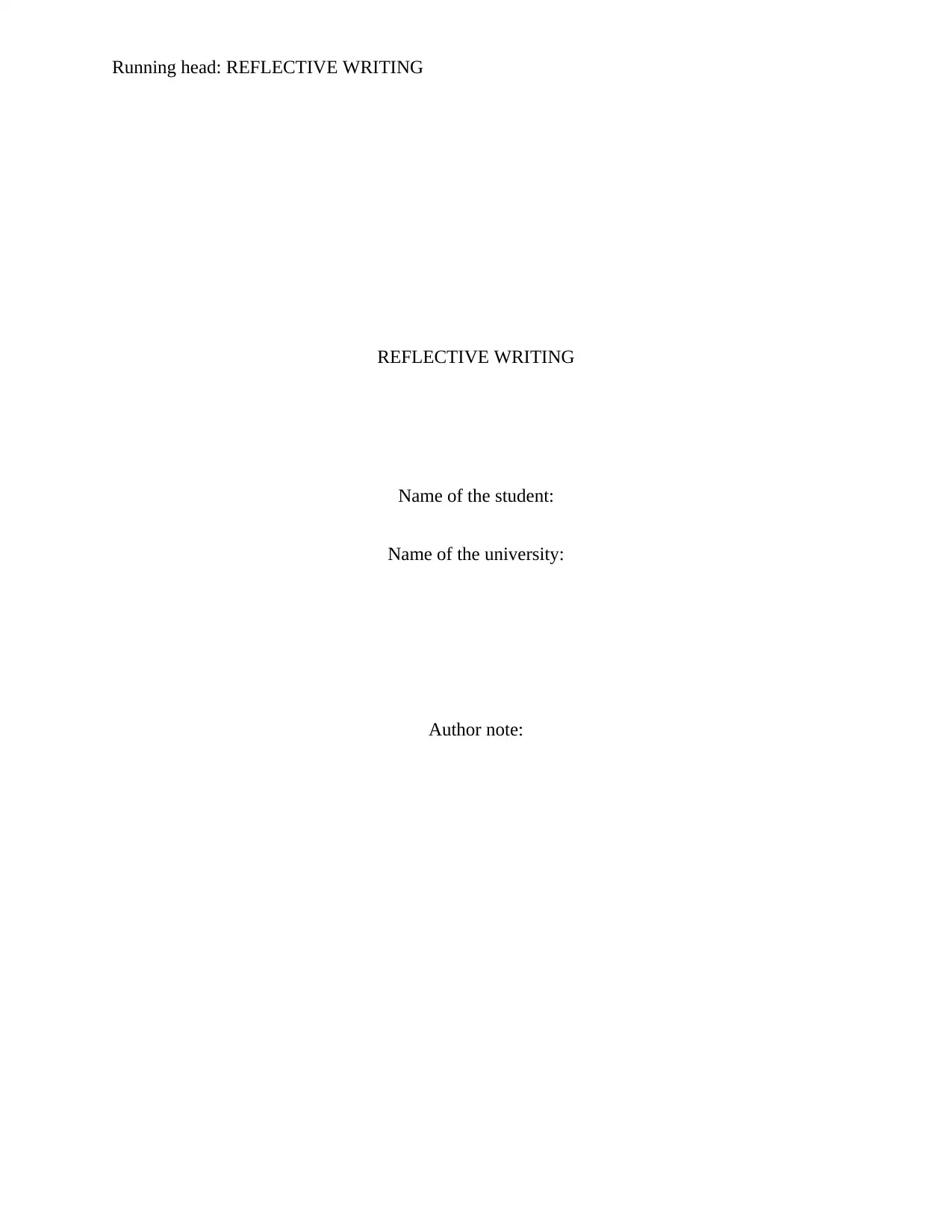
Running head: REFLECTIVE WRITING
REFLECTIVE WRITING
Name of the student:
Name of the university:
Author note:
REFLECTIVE WRITING
Name of the student:
Name of the university:
Author note:
Paraphrase This Document
Need a fresh take? Get an instant paraphrase of this document with our AI Paraphraser
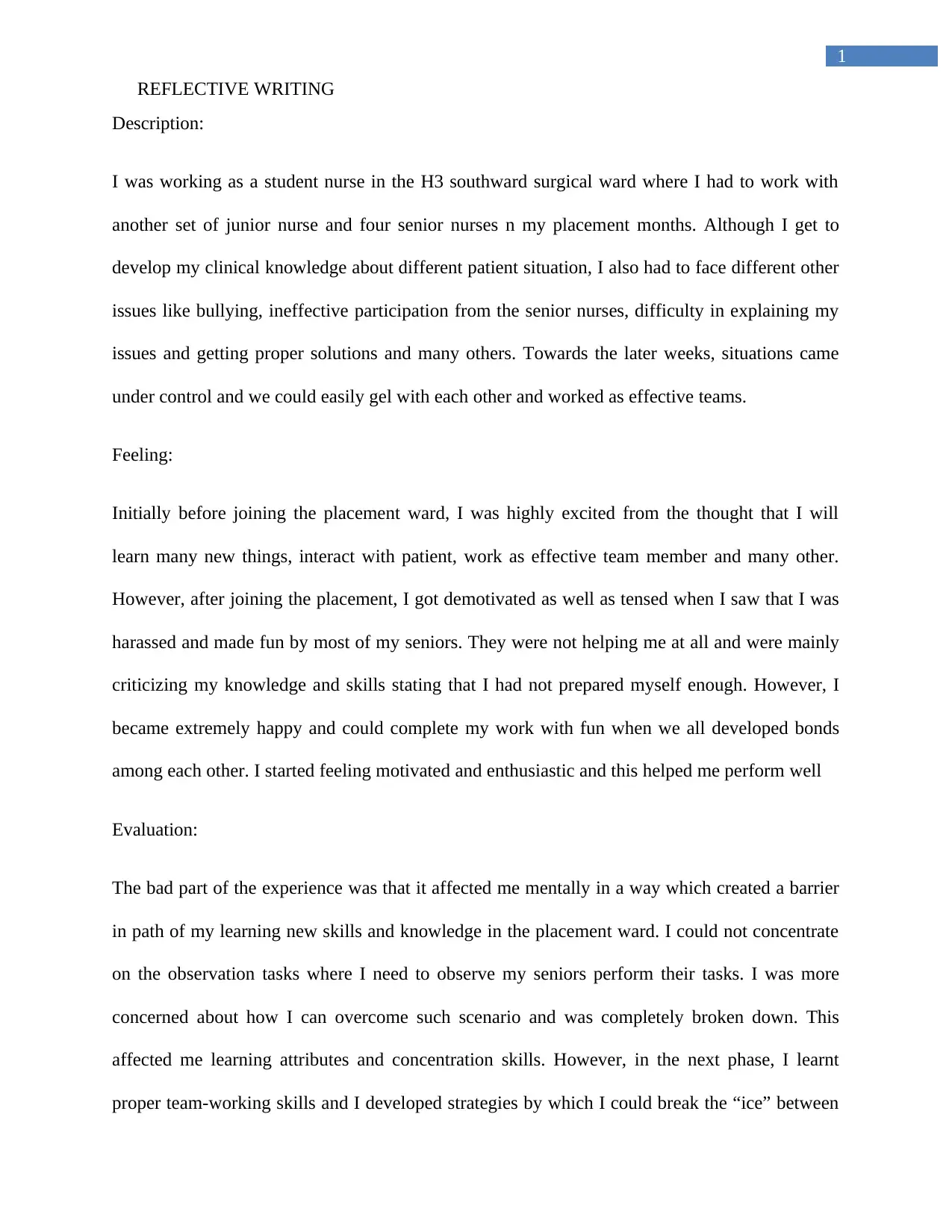
1
REFLECTIVE WRITING
Description:
I was working as a student nurse in the H3 southward surgical ward where I had to work with
another set of junior nurse and four senior nurses n my placement months. Although I get to
develop my clinical knowledge about different patient situation, I also had to face different other
issues like bullying, ineffective participation from the senior nurses, difficulty in explaining my
issues and getting proper solutions and many others. Towards the later weeks, situations came
under control and we could easily gel with each other and worked as effective teams.
Feeling:
Initially before joining the placement ward, I was highly excited from the thought that I will
learn many new things, interact with patient, work as effective team member and many other.
However, after joining the placement, I got demotivated as well as tensed when I saw that I was
harassed and made fun by most of my seniors. They were not helping me at all and were mainly
criticizing my knowledge and skills stating that I had not prepared myself enough. However, I
became extremely happy and could complete my work with fun when we all developed bonds
among each other. I started feeling motivated and enthusiastic and this helped me perform well
Evaluation:
The bad part of the experience was that it affected me mentally in a way which created a barrier
in path of my learning new skills and knowledge in the placement ward. I could not concentrate
on the observation tasks where I need to observe my seniors perform their tasks. I was more
concerned about how I can overcome such scenario and was completely broken down. This
affected me learning attributes and concentration skills. However, in the next phase, I learnt
proper team-working skills and I developed strategies by which I could break the “ice” between
REFLECTIVE WRITING
Description:
I was working as a student nurse in the H3 southward surgical ward where I had to work with
another set of junior nurse and four senior nurses n my placement months. Although I get to
develop my clinical knowledge about different patient situation, I also had to face different other
issues like bullying, ineffective participation from the senior nurses, difficulty in explaining my
issues and getting proper solutions and many others. Towards the later weeks, situations came
under control and we could easily gel with each other and worked as effective teams.
Feeling:
Initially before joining the placement ward, I was highly excited from the thought that I will
learn many new things, interact with patient, work as effective team member and many other.
However, after joining the placement, I got demotivated as well as tensed when I saw that I was
harassed and made fun by most of my seniors. They were not helping me at all and were mainly
criticizing my knowledge and skills stating that I had not prepared myself enough. However, I
became extremely happy and could complete my work with fun when we all developed bonds
among each other. I started feeling motivated and enthusiastic and this helped me perform well
Evaluation:
The bad part of the experience was that it affected me mentally in a way which created a barrier
in path of my learning new skills and knowledge in the placement ward. I could not concentrate
on the observation tasks where I need to observe my seniors perform their tasks. I was more
concerned about how I can overcome such scenario and was completely broken down. This
affected me learning attributes and concentration skills. However, in the next phase, I learnt
proper team-working skills and I developed strategies by which I could break the “ice” between
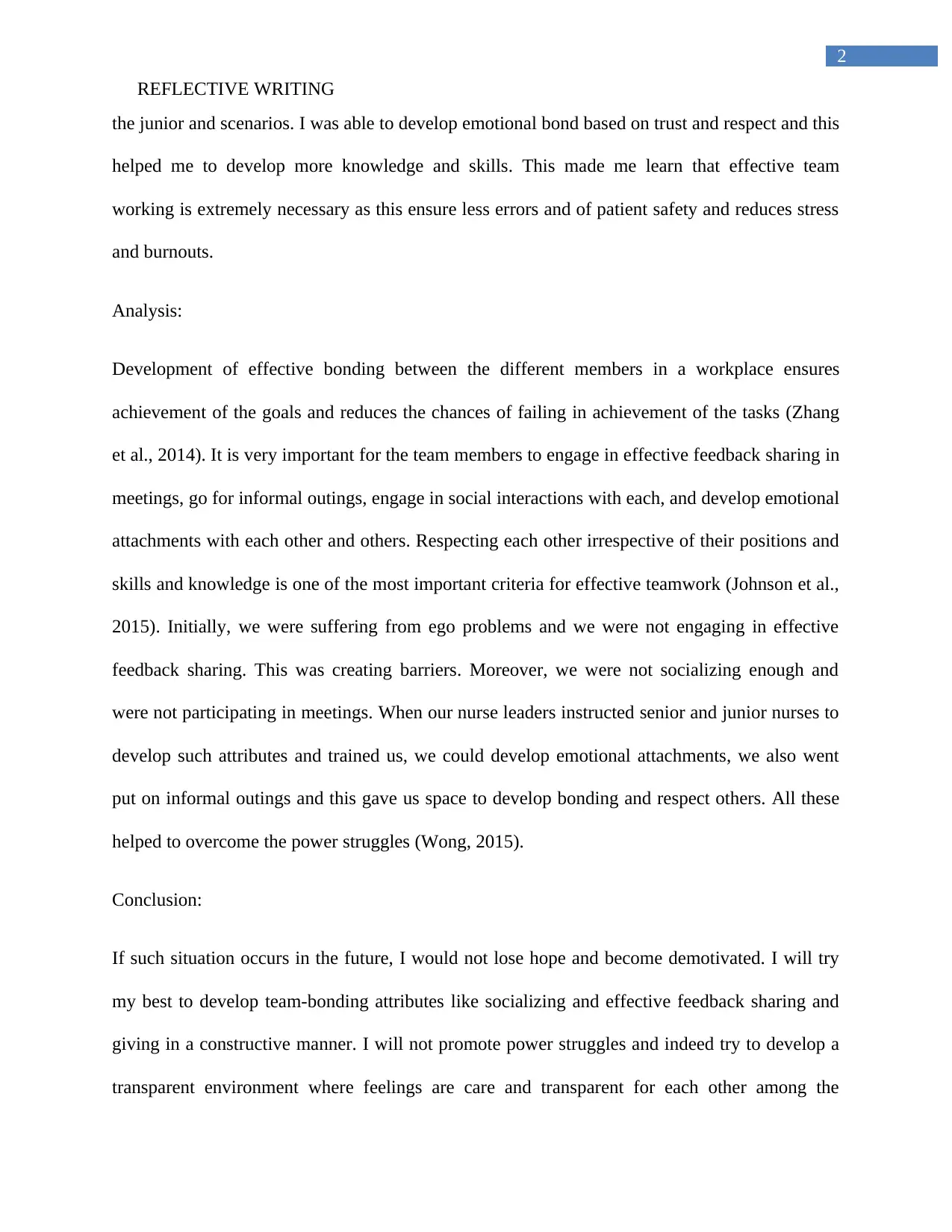
2
REFLECTIVE WRITING
the junior and scenarios. I was able to develop emotional bond based on trust and respect and this
helped me to develop more knowledge and skills. This made me learn that effective team
working is extremely necessary as this ensure less errors and of patient safety and reduces stress
and burnouts.
Analysis:
Development of effective bonding between the different members in a workplace ensures
achievement of the goals and reduces the chances of failing in achievement of the tasks (Zhang
et al., 2014). It is very important for the team members to engage in effective feedback sharing in
meetings, go for informal outings, engage in social interactions with each, and develop emotional
attachments with each other and others. Respecting each other irrespective of their positions and
skills and knowledge is one of the most important criteria for effective teamwork (Johnson et al.,
2015). Initially, we were suffering from ego problems and we were not engaging in effective
feedback sharing. This was creating barriers. Moreover, we were not socializing enough and
were not participating in meetings. When our nurse leaders instructed senior and junior nurses to
develop such attributes and trained us, we could develop emotional attachments, we also went
put on informal outings and this gave us space to develop bonding and respect others. All these
helped to overcome the power struggles (Wong, 2015).
Conclusion:
If such situation occurs in the future, I would not lose hope and become demotivated. I will try
my best to develop team-bonding attributes like socializing and effective feedback sharing and
giving in a constructive manner. I will not promote power struggles and indeed try to develop a
transparent environment where feelings are care and transparent for each other among the
REFLECTIVE WRITING
the junior and scenarios. I was able to develop emotional bond based on trust and respect and this
helped me to develop more knowledge and skills. This made me learn that effective team
working is extremely necessary as this ensure less errors and of patient safety and reduces stress
and burnouts.
Analysis:
Development of effective bonding between the different members in a workplace ensures
achievement of the goals and reduces the chances of failing in achievement of the tasks (Zhang
et al., 2014). It is very important for the team members to engage in effective feedback sharing in
meetings, go for informal outings, engage in social interactions with each, and develop emotional
attachments with each other and others. Respecting each other irrespective of their positions and
skills and knowledge is one of the most important criteria for effective teamwork (Johnson et al.,
2015). Initially, we were suffering from ego problems and we were not engaging in effective
feedback sharing. This was creating barriers. Moreover, we were not socializing enough and
were not participating in meetings. When our nurse leaders instructed senior and junior nurses to
develop such attributes and trained us, we could develop emotional attachments, we also went
put on informal outings and this gave us space to develop bonding and respect others. All these
helped to overcome the power struggles (Wong, 2015).
Conclusion:
If such situation occurs in the future, I would not lose hope and become demotivated. I will try
my best to develop team-bonding attributes like socializing and effective feedback sharing and
giving in a constructive manner. I will not promote power struggles and indeed try to develop a
transparent environment where feelings are care and transparent for each other among the
⊘ This is a preview!⊘
Do you want full access?
Subscribe today to unlock all pages.

Trusted by 1+ million students worldwide
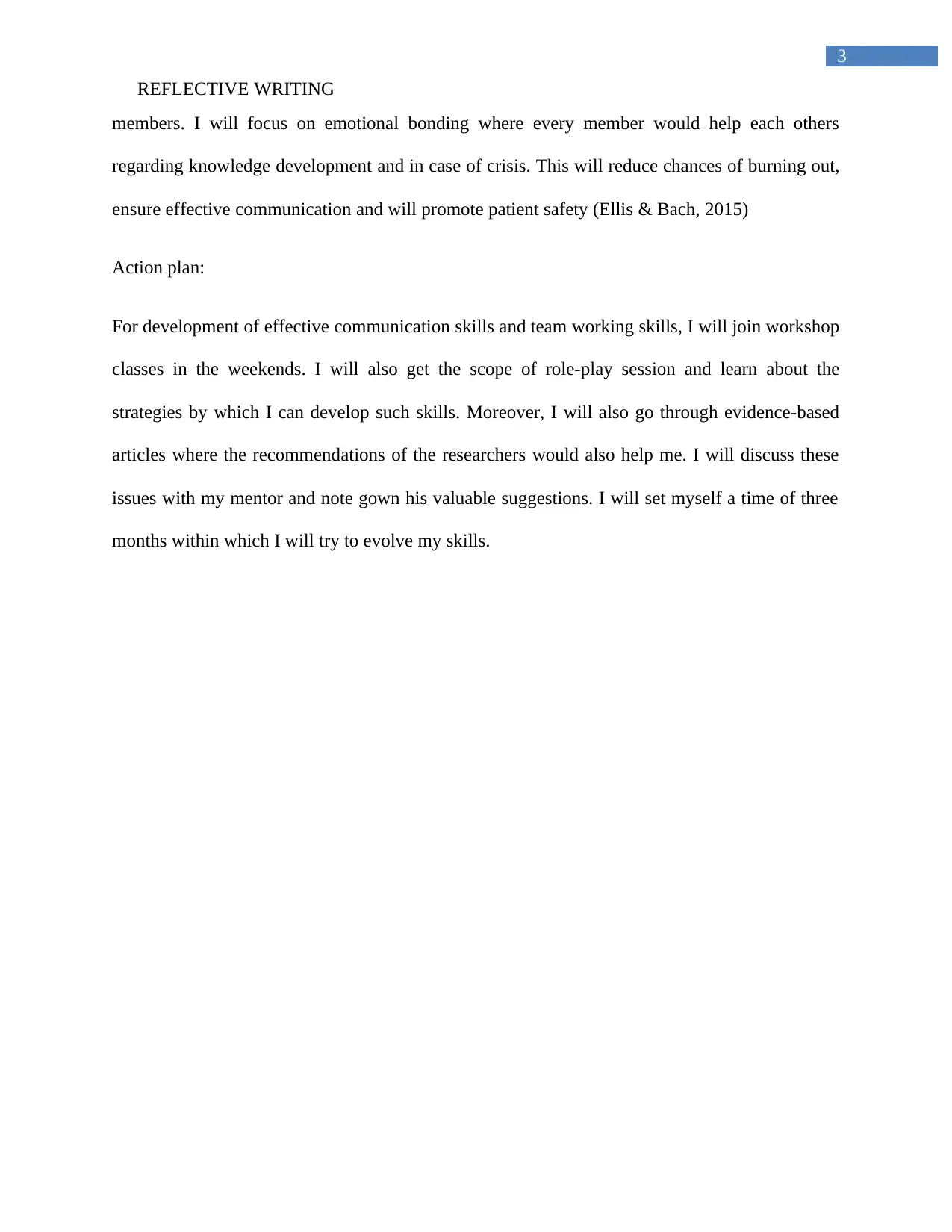
3
REFLECTIVE WRITING
members. I will focus on emotional bonding where every member would help each others
regarding knowledge development and in case of crisis. This will reduce chances of burning out,
ensure effective communication and will promote patient safety (Ellis & Bach, 2015)
Action plan:
For development of effective communication skills and team working skills, I will join workshop
classes in the weekends. I will also get the scope of role-play session and learn about the
strategies by which I can develop such skills. Moreover, I will also go through evidence-based
articles where the recommendations of the researchers would also help me. I will discuss these
issues with my mentor and note gown his valuable suggestions. I will set myself a time of three
months within which I will try to evolve my skills.
REFLECTIVE WRITING
members. I will focus on emotional bonding where every member would help each others
regarding knowledge development and in case of crisis. This will reduce chances of burning out,
ensure effective communication and will promote patient safety (Ellis & Bach, 2015)
Action plan:
For development of effective communication skills and team working skills, I will join workshop
classes in the weekends. I will also get the scope of role-play session and learn about the
strategies by which I can develop such skills. Moreover, I will also go through evidence-based
articles where the recommendations of the researchers would also help me. I will discuss these
issues with my mentor and note gown his valuable suggestions. I will set myself a time of three
months within which I will try to evolve my skills.
Paraphrase This Document
Need a fresh take? Get an instant paraphrase of this document with our AI Paraphraser
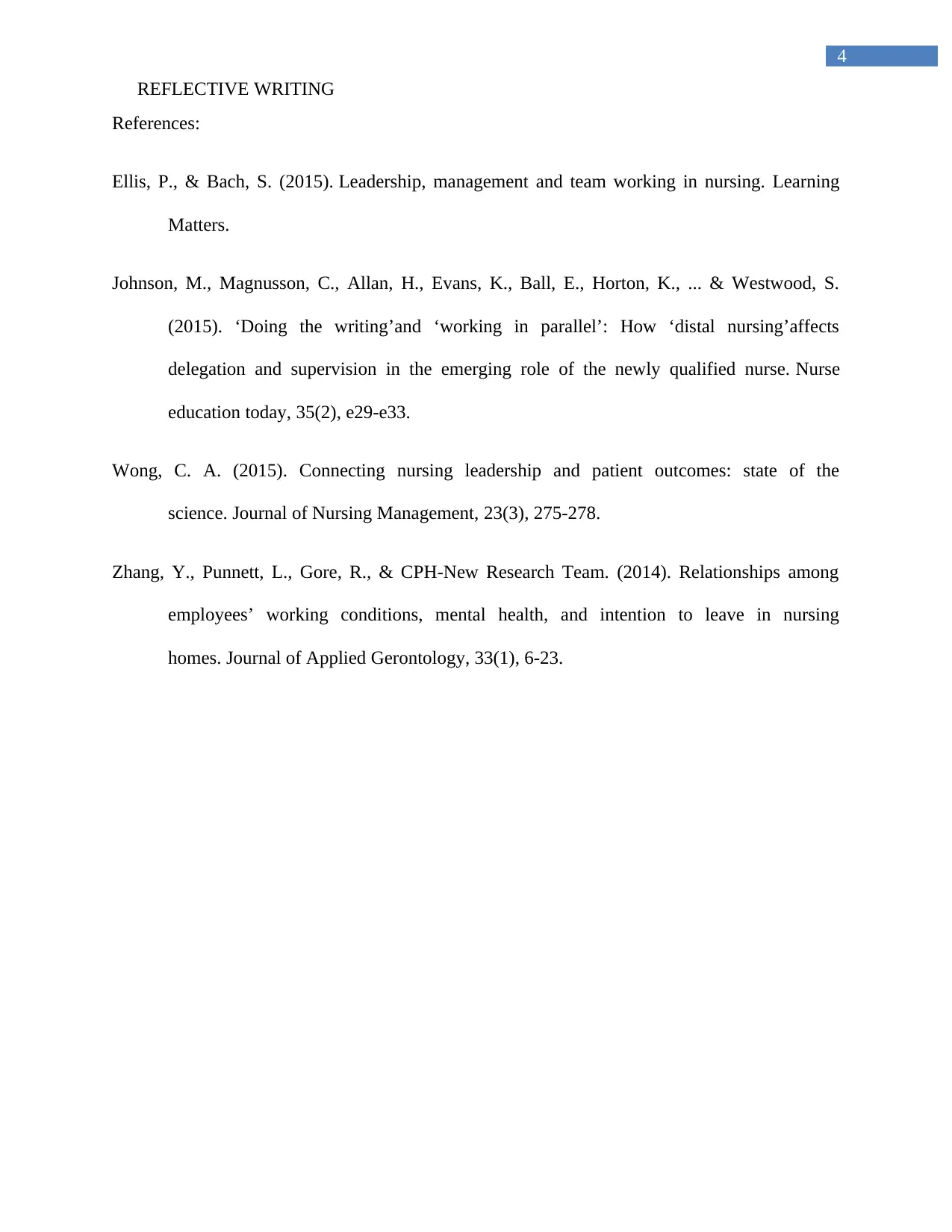
4
REFLECTIVE WRITING
References:
Ellis, P., & Bach, S. (2015). Leadership, management and team working in nursing. Learning
Matters.
Johnson, M., Magnusson, C., Allan, H., Evans, K., Ball, E., Horton, K., ... & Westwood, S.
(2015). ‘Doing the writing’and ‘working in parallel’: How ‘distal nursing’affects
delegation and supervision in the emerging role of the newly qualified nurse. Nurse
education today, 35(2), e29-e33.
Wong, C. A. (2015). Connecting nursing leadership and patient outcomes: state of the
science. Journal of Nursing Management, 23(3), 275-278.
Zhang, Y., Punnett, L., Gore, R., & CPH-New Research Team. (2014). Relationships among
employees’ working conditions, mental health, and intention to leave in nursing
homes. Journal of Applied Gerontology, 33(1), 6-23.
REFLECTIVE WRITING
References:
Ellis, P., & Bach, S. (2015). Leadership, management and team working in nursing. Learning
Matters.
Johnson, M., Magnusson, C., Allan, H., Evans, K., Ball, E., Horton, K., ... & Westwood, S.
(2015). ‘Doing the writing’and ‘working in parallel’: How ‘distal nursing’affects
delegation and supervision in the emerging role of the newly qualified nurse. Nurse
education today, 35(2), e29-e33.
Wong, C. A. (2015). Connecting nursing leadership and patient outcomes: state of the
science. Journal of Nursing Management, 23(3), 275-278.
Zhang, Y., Punnett, L., Gore, R., & CPH-New Research Team. (2014). Relationships among
employees’ working conditions, mental health, and intention to leave in nursing
homes. Journal of Applied Gerontology, 33(1), 6-23.
1 out of 5
Related Documents
Your All-in-One AI-Powered Toolkit for Academic Success.
+13062052269
info@desklib.com
Available 24*7 on WhatsApp / Email
![[object Object]](/_next/static/media/star-bottom.7253800d.svg)
Unlock your academic potential
Copyright © 2020–2026 A2Z Services. All Rights Reserved. Developed and managed by ZUCOL.





